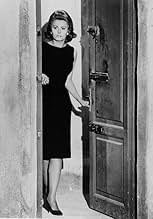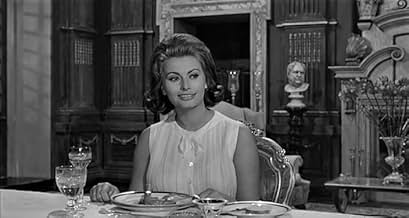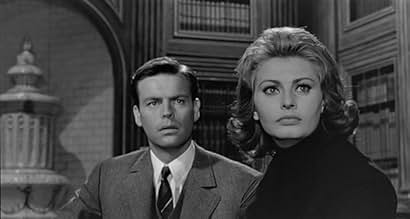IMDb RATING
6.7/10
697
YOUR RATING
An insane German war criminal lives in a secluded house owned by his rich father who lets him think the war is still on, some 15 years after the fact.An insane German war criminal lives in a secluded house owned by his rich father who lets him think the war is still on, some 15 years after the fact.An insane German war criminal lives in a secluded house owned by his rich father who lets him think the war is still on, some 15 years after the fact.
- Director
- Writers
- Stars
- Awards
- 2 wins & 1 nomination total
Carlo Antonini
- Police Official
- (uncredited)
Antonia Cianci
- Maid
- (uncredited)
Alfredo Franchi
- Groundskeeper
- (uncredited)
Roberto Massa
- Chauffeur
- (uncredited)
Osvaldo Peccioli
- Cook
- (uncredited)
Lucia Pelella
- Groundskeeper's wife
- (uncredited)
- Director
- Writers
- All cast & crew
- Production, box office & more at IMDbPro
Featured reviews
It was very long ago, but this film touched me deeply. A became obsessed with Shostakovich's 11th Symphony, and remember vividly some scenes. When Maximillian Schell is finally "released" and goes out into the city (Hamburg?) to see what Germany has become, he is repulsed. When Frederich March is told he will die, he is solemn. The plot, that they have hidden their son because he is a wanted war criminal. That they collaborated willingly with the Nazis, as an industrial power. Perhaps I have forgotten important details. But the movie resonates with me.
I saw this movie on the big screen several years ago in San Diego and I've never forgotten it. This movie falls loosely within the Holocaust/antisemitic genre and I'm surprised that many of my fellow Jews have never even heard of it. The idea of a family keeping their ex-Nazi son in the attic (it's not the basement)to protect him from the public is intriguing to say the least. There are a few scenes that I can never forget: Max Schell still wearing his Nazi uniform; his sister wiping up his excrement off the floor, like the family pet; Schell unwrapping and eating chocolate that's wrapped in Nazi tinfoil. To be kept away all these years from communicating with the outside world that's changed so much from the Nazi era. The last scene with Schell and Frederick March standing above the industrial complex that's been created. All these scenes stand out in my mind. The stark black and white film ties in exactly with that dark period in German/Jewish history. I'll never forget this movie. I wish so much that it is someday available in a DVD or (please don't) VHS version--even a copy from a TV movie showing on, say, the Fox movie channel. Anybody have a copy for sale? Contact me.
I like most movies De Sica directed but this is a mediocre tale of a German industrialist dying of cancer, who wants to leave his estate to his second son Werner, while his first son Franz who was a Nazi officer, to escape justice is sheltered in his father's estate and thinks the war is still going on in 1962. It is based on a play by Sartre, which I guess was not successful, and like most movies based on plays, it feels claustrophobic.
Sophia Loren plays Werner's wife and since the movie producer was Carlo Ponti, he used this opportunity - like many other - to showcase his girlfriend Loren as a "real actress". Loren'skills as an actress are debatable, and even Ponti preferred to bet on some of her other assets. That's why even if the action takes place in freezing Hamburg, in a long key scene Loren wears a slip dress, displaying her ample cleavage.
Totally missable, third-rate movie.
Sophia Loren plays Werner's wife and since the movie producer was Carlo Ponti, he used this opportunity - like many other - to showcase his girlfriend Loren as a "real actress". Loren'skills as an actress are debatable, and even Ponti preferred to bet on some of her other assets. That's why even if the action takes place in freezing Hamburg, in a long key scene Loren wears a slip dress, displaying her ample cleavage.
Totally missable, third-rate movie.
I always regarded "The Prisoners of Altona" as Sartre's most interesting and perhaps best play, but I did not know that Vittorio de Sica had made a film on it and with Sophia Loren and other great actors, Cesare Zavattini having even somewhat added to the play. The main interest of the play is that it's a Frenchman's assessment of the post-war German situation with acute observations, conclusions and profound considerations. The main character Franz has never left the war behind, while his father, a great industrialist tycoon, has received his own death sentence by a cancer diagnosis and faces the problem and necessity of allowing his life's work a continuity. He has another son (Sophia Loren's husband, Robert Wagner,) who is willing to accept to take over, but his elder brother looms as the bearer of an ominous destiny of the family. Franz (Maximilian Schell) ultimately refuses to accept that Germany is flourishing again, that it is rising to new power and prosperity and clinches to his experience of a defeated nation all in ruins with its people resorting to underground beggary and scavenging, as if the reality of its ruin was of greater comfort to him than any news of its prosperity. Vittorio de Sica made this film two years after "Two Women", and it's in the same vein - relentless realism brought to overwhelming pathos and tragedy. He alternated his serious films with comedies and loved to act himself in comedies, he was more active as an actor and comedian than as a director, but his serious films remain his masterpieces. There is no sweet and lovely Italian music here but the bleak and depressive wailing disharmonies of Shostakovich instead, which actually provide an appropriate mood and accompaniment to this very morose film. It's not one of his best films, but it certainly belongs to his most interesting.
When a movie from 1962 has less than 200 votes on IMDb, what does it mean? Directed by legendary De Sica, and starring great Sophia Loren... it must be a terrible failure? Well, it isn't.
Having read Sartre's play "The Condemned of Altona", it is my impression that the movie is very faithful to its atmosphere. There are some changes, of course: instead of concentrating exclusively on torturing his characters inside the mansion (as Sartre does), De Sica takes advantage of possibilities of film, adding outdoor scenes.
I don't want to reveal the plot, although it is very interesting. I recommend reading the play first, since the relations between characters will be clearer then. Anyway, see this movie if you get the chance!
Having read Sartre's play "The Condemned of Altona", it is my impression that the movie is very faithful to its atmosphere. There are some changes, of course: instead of concentrating exclusively on torturing his characters inside the mansion (as Sartre does), De Sica takes advantage of possibilities of film, adding outdoor scenes.
I don't want to reveal the plot, although it is very interesting. I recommend reading the play first, since the relations between characters will be clearer then. Anyway, see this movie if you get the chance!
Did you know
- TriviaSpencer Tracy was offered but declined the role of Albrecht von Gerlach.
- GoofsNazi uniforms were banned after the war, yet Franz walks through the city without being arrested or beaten up. He gets a few strange looks but is otherwise ignored.
- Alternate versionsEvery reference to National Socialism was cut from the West German version in 1962.
- How long is The Condemned of Altona?Powered by Alexa
Details
- Release date
- Countries of origin
- Languages
- Also known as
- Die Eingeschlossenen
- Filming locations
- Production companies
- See more company credits at IMDbPro
Box office
- Gross US & Canada
- $2,398,000
- Runtime
- 1h 54m(114 min)
- Color
- Sound mix
- Aspect ratio
- 2.35 : 1
Contribute to this page
Suggest an edit or add missing content





























